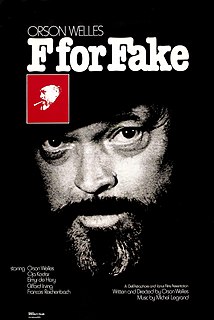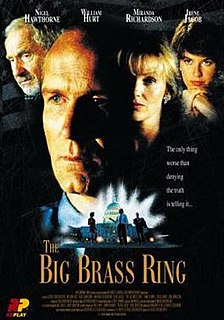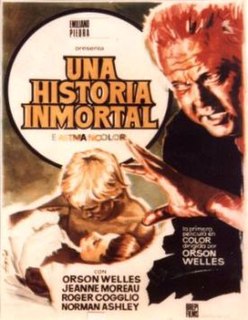Related Research Articles

George Orson Welles was an American director, actor, screenwriter and producer who is remembered for his innovative work in radio, theatre and film. He is considered to be among the greatest and most influential filmmakers of all time.

F for Fake is a 1973 docudrama film co-written, directed by, and starring Orson Welles who worked on the film alongside François Reichenbach, Oja Kodar, and Gary Graver. Initially released in 1974, it focuses on Elmyr de Hory's recounting of his career as a professional art forger; de Hory's story serves as the backdrop for a meandering investigation of the natures of authorship and authenticity, as well as the basis of the value of art. Far from serving as a traditional documentary on de Hory, the film also incorporates Welles's companion Oja Kodar, hoax biographer Clifford Irving, and Orson Welles as himself. F for Fake is sometimes considered an example of a film essay.

The Big Brass Ring is a 1999 drama film, starring William Hurt, Nigel Hawthorne, Irene Jacob, Jefferson Mays and Miranda Richardson. The film's script was heavily rewritten by George Hickenlooper and F. X. Feeney from a previous screenplay written by Orson Welles and Oja Kodar in the early 1980s; Hickenlooper also directed the film.
Oja Kodar is a Croatian actress, screenwriter and director known as Orson Welles's partner during the later years of his life.

It's All True is an unfinished Orson Welles feature film comprising three stories about Latin America. "My Friend Bonito" was supervised by Welles and directed by Norman Foster in Mexico in 1941. "Carnaval" and "Jangadeiros" were directed by Welles in Brazil in 1942. It was to have been Welles's third film for RKO Radio Pictures, after Citizen Kane (1941) and The Magnificent Ambersons (1942). The project was a co-production of RKO and the Office of the Coordinator of Inter-American Affairs that was later terminated by RKO.

The Immortal Story is a 1968 French film directed by Orson Welles and starring Jeanne Moreau. The film was originally broadcast on French television and was later released in theatres. It was based on a short story by the Danish writer Karen Blixen. With a running time of sixty minutes, it is the shortest feature film directed by Welles.
Someone to Love is a 1987 comedy film directed by Henry Jaglom. It was Orson Welles' final live action film appearance, released after his death but produced before his voice-over in The Transformers: The Movie, his final film performance.

The Other Side of the Wind is a 2018 experimental film directed, co-written, co-produced and co-edited by Orson Welles, released in 2018 after more than forty years in development. The film stars John Huston, Bob Random, Peter Bogdanovich, Susan Strasberg and Oja Kodar. Shooting began in 1970 for what Welles intended to be his Hollywood comeback, and resumed on-and-off until 1976. Welles continued to intermittently work on the project into the 1980s, but it became embroiled in legal, financial, and political complications which prevented it from being completed.

This is Orson Welles is a 1992 book by Orson Welles (1915–1985) and Peter Bogdanovich that comprises conversations between the two filmmakers recorded over several years, beginning in 1969. The wide-ranging volume encompasses Welles's life and his own stage, radio, and film work as well as his insights on the work of others. The interview book was transcribed by Bogdanovich after Welles's death, at the request of Welles's longtime companion and professional collaborator, Oja Kodar.
Don Quixote is an unfinished film project written, co-produced and directed by Orson Welles. Principal photography took place between 1957 and 1969. Test footage was filmed as early as 1955, second-unit photography was done as late as 1972, and Welles was working on the film intermittently until his death in 1985. The film was eventually edited by Jesús Franco and was released in 1992, to mixed reviews.
The Deep is an unfinished film directed by Orson Welles, based on Charles Williams' novel Dead Calm (1963), which was later adapted as an eponymous 1989 film. Welles produced and wrote The Deep, as well as played the role of Russ Brewer opposite Jeanne Moreau and Laurence Harvey.
The Secret of Nikola Tesla, is a 1980 Yugoslav biographical film which details events in the life of the Serbian-American engineer and inventor Nikola Tesla (1856–1943), portrayed by Serbian actor Petar Božović. Tesla grew up in the Austro-Hungarian Empire, studied engineering and physics, and moved to New York in 1884. He became an American citizen in 1891 and is known for his contributions to electrical engineering.

The Merchant of Venice is a 1969 drama short film directed by Orson Welles based on William Shakespeare's play of the same name. While actually completed, it is frequently cited as an unfinished film, though better described as a partially lost film due to the loss of film elements.
Filming 'The Trial' is an unfinished making-of film by Orson Welles, made in 1981, which focuses on the production of his 1962 film The Trial.
Orson Welles' Magic Show is an unfinished television special by Orson Welles, filmed between 1976 and 1985. In it, Welles performs various magic tricks for the camera, promising that no trick photography is used.
The Spirit of Charles Lindbergh is a short film made in 1984 by Orson Welles. The film was intended as a private video letter from Welles to his longtime friend and accountant Bill Cronshaw, who was ill. In the film, Welles sits behind a typewriter at his desk and speaks of the human spirit, quoting the journal of aviator Charles Lindbergh. Welles was in visibly poor health himself when the film was made, and he did not intend for it to be seen by the public.
One Man Band, also known as London and Swinging London is an unfinished short film made by Orson Welles between 1968 and 1971. The film started life as a part of a 90-minute TV special for CBS, entitled Orson's Bag, consisting of Welles' 40-minute condensation of The Merchant of Venice, and assorted sketches around Europe. This was abandoned in 1969 when CBS withdrew its funding over Welles' long-running disputes with US authorities regarding his tax status, and Welles continued to fashion the footage in his own style.
Moby Dick is an unfinished film by Orson Welles, filmed in 1971. It is not to be confused with the incomplete 1955 film Welles made of his meta-play Moby Dick—Rehearsed, or with the 1956 film Moby Dick, in which Welles played a supporting role.
Doktor Rej i đavoli is a 2012 Serbian film directed by Dinko Tucaković. It is co-written by Tucaković and Saša Radojević with input from Dimitrije Vojnov.
The Heroine is an uncompleted 1967 film, now lost, that was directed by Orson Welles.
References
- ↑ Brady, Frank. “Citizen Welles,” 1989. Charles Scribner’s Sons. ISBN 0-684-18982-8
- 1 2 3 4 “From the Beginning: Notes on Orson Welles' Most Personal Late Film,” Senses of Cinema
- 1 2 “The Bootleg Files: The Dreamers,” Film Threat, September 16, 2005